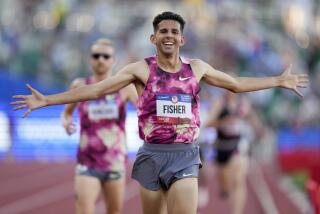SPEEDSKATING : Blair Concludes Olympic Trials With a Flair
- Share via
MILWAUKEE — Bonnie Blair wrapped up the U.S. Olympic long-track speedskating trials with her eighth track record in nine races, strong evidence of her readiness for next month’s Winter Olympics.
Even after competing in the Games three times, winning four medals and becoming the only woman to win consecutive gold medals in the 500-meter sprint, Blair is having no trouble motivating herself for Lillehammer.
“This one being inside, the times are going to be fast, and that psyches me up. That’s what this sport is all about--speed,” Blair said after cruising to a time of 1:20.46 in Sunday’s 1,000-meter race at the Pettit National Ice Center. “You know it’s going to be fast, and that’s what’s more exciting about this Olympics than the last one.”
Blair qualified in the 500--in which she holds the world record of 39.10 seconds--the 1,000 and the 1,500, although she hasn’t decided if she will race the 1,500. Also qualifying in the 1,000 Sunday were Chantal Bailey of Boulder, Colo., Michelle Kline of Circle Pines, Minn., and 18-year-old Chris Witty of West Allis, Wis., a first-time Olympian.
Dan Jansen skipped Sunday’s 1,000-meter race, but his first two times made him the top qualifier. Nathaniel Mills of Evanston, Ill., who also qualified in the 500 and 1,500, was second overall. Brendan Eppert of St. Louis, a first-time Olympian at 23, was third in the 1,000 point standings, one spot ahead of Dave Besteman of Madison, Wis. Besteman will also race the 500.
“Right now Dan’s mentally tired and he doesn’t want to see the ice for a couple of days, so he’s not going to come here for two days,” said his coach, Peter Mueller. “(The trials) didn’t do much for him in terms of motivation. Lillehammer will be better, and just the competition will bring Dan to a different level.”
Kristen Talbot of Schuylerville, N.Y., didn’t qualify in the 1,000 but was assured a berth in the 500. That lifted her spirits for the ordeal she faces Tuesday at Johns Hopkins Hospital in Baltimore, where she will donate bone marrow to her brother, Jason, who is suffering from aplastic anemia.
The procedure will keep her overnight at Johns Hopkins Hospital in Baltimore and render her too weak to train at a normal pace for about two weeks. However, she expects to be at full strength for the Games.
“It’s been a rough couple of weeks,” she said. “I’m exhausted now. I don’t think I realized how much stress I’ve had on me. . . . I’m pretty calm (about her procedure), but I’m nervous for Jason. I’m glad he’s done so well with his chemotherapy, and that’s what I was most worried about.”
Christine Scheels of New Berlin, Wis., won the 5,000 meters in 7:58.11, but her participation in the Olympics hinges on her time in the 3,000 at the Games. KC Boutiette, winner of Sunday’s 10,000 in a track-record time of 14:50.66, is in an even dicier situation.
The International Olympic Committee has limited the field in the women’s 3,000 and men’s 5,000 to the 32 fastest times, with a maximum of three skaters per country. The 16 fastest skaters in those races will qualify for the women’s 5,000 and men’s 10,000.
Bailey, Scheels and Angela Zuckerman appear likely to make the final 32 in the 3,000, but competition is tougher in the men’s ranks and the U.S. trials leaders in the 5,000 are unlikely to make the Olympic field. Boutiette, Dave Tamburrino of Saratoga Springs, N.Y., and Brian Wanek of Mequon, Wis., were the top finishers in the 5,000, but Boutiette’s best of 7:07.96 is 10 to 12 seconds off the expected cutoff time.
Boutiette, Wanek and Brian Smith of Cedar Rapids, Iowa, were the top three finishers in the 10,000, but Boutiette’s time was almost 45 seconds off the American record and 67 seconds off the world mark. Milwaukee will be host oftwo more open, international meets in which skaters can reduce their times by the International Skating Union’s Jan. 30 deadline.
More to Read
Go beyond the scoreboard
Get the latest on L.A.'s teams in the daily Sports Report newsletter.
You may occasionally receive promotional content from the Los Angeles Times.







